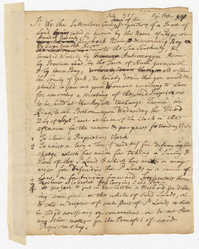

Coll. 61, vol. 7, pg. 401Example of a proprietor meeting at the Royall Exchange Tavern on King Street in Boston.
While claiming ownership to hundreds of thousands of acres in Maine, most of the presiding members of the Kennebec and Pejepscot Proprietors lived in and around Boston. Both companies conducted major business in the city, often in taverns like the Royal Exchange. At meetings, the companies weighted votes according to shares held, so a handful of individuals set company policy. Sale and division to heirs of the original proprietors meant that by 1750, both the Kennebec and Pejepscot Proprietors consisted of numerous men and women holding fractions of a share. Although female heirs voted and affixed their signatures to decisions requiring all shareholders’ approval, they do not appear to have attended most meetings where company policies were hammered out. Boston women actively participated in other financial ventures in the eighteenth century, but the evidence of whether the female shareholders sought a greater role in company affairs or not is unclear.
In the Kennebec Proprietors, someone who held eight out of the available 192 portions was considered to have a single share, worth approximately £216 during the 1750s, at a time when an artisan in Massachusetts could feed a family on £50 per year. When the companies surveyed and parceled out portions of their “undivided” land, acreage was assigned according to shares. Proprietors who held onto their company shares long enough—however small—received significant landholdings. Even the smallest Kennebec shareholders received 1,600 acres by 1795. Neither company called general meetings to handle routine business, rather handling it through small standing committees. These committees, comprised of at least one major shareholder and the company clerk, made most of the decisions about managing the new, unincorporated towns on proprietary lands.